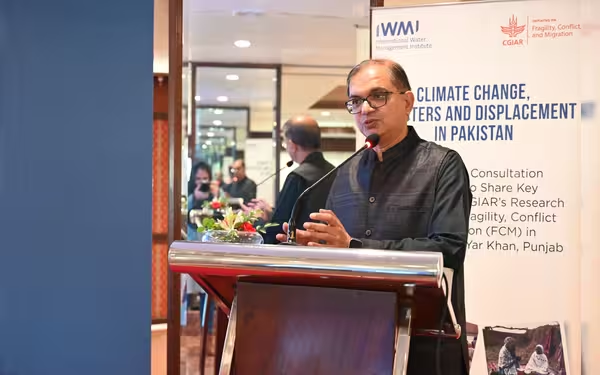Monday, December 30, 2024 06:00 PM
Climate Migration Challenges in Pakistan: A Call to Action
- Climate change drives migration in vulnerable communities.
- Agricultural disruptions lead to urban migration.
- Collaboration is essential for sustainable solutions.
 Image Credits: en.dailypakistan.com.pk
Image Credits: en.dailypakistan.com.pkA study reveals climate migration challenges in Pakistan, urging immediate action for vulnerable communities affected by climate change.
Climate change is a pressing issue that affects millions of people around the world, and Pakistan is no exception. The country is particularly vulnerable to climate-induced disasters, which have been increasing in frequency and intensity. These disasters, such as floods and droughts, not only threaten the environment but also have severe implications for the livelihoods of marginalized communities. A recent study conducted by the International Water Management Institute (IWMI) sheds light on these challenges, focusing on regions like Sindh, Balochistan, and south Punjab.
During a multi-stakeholder workshop held in Lahore, experts gathered to discuss the findings of the IWMI study. The workshop brought together government officials, researchers, civil society representatives, and development partners, all of whom shared a common goal: to address the pressing issues of climate migration and its impact on vulnerable populations. The discussions highlighted how climate change is forcing people to leave their homes in search of better living conditions, leading to a phenomenon known as climate migration.
In areas like Sindh and Balochistan, where agriculture is the primary source of income, the effects of climate change are particularly devastating. Farmers are facing unpredictable weather patterns, which result in crop failures and loss of income. As a result, many families are compelled to migrate to urban areas in search of work and stability. This migration not only disrupts their lives but also places additional strain on already overburdened cities.
The study emphasizes the need for comprehensive policies that address the root causes of climate migration. It calls for collaboration among various stakeholders to develop strategies that can help communities adapt to changing environmental conditions. This includes investing in sustainable agricultural practices, improving water management, and enhancing disaster preparedness. By taking proactive measures, Pakistan can better equip its communities to face the challenges posed by climate change.
The findings of the IWMI study serve as a wake-up call for Pakistan. Climate migration is not just an environmental issue; it is a humanitarian crisis that requires immediate attention. By fostering collaboration among government, civil society, and the private sector, Pakistan can create a more resilient future for its vulnerable communities. It is essential to recognize that addressing climate change is not only about protecting the environment but also about safeguarding the lives and livelihoods of millions of people. The time to act is now, and every effort counts in building a sustainable future for all.













